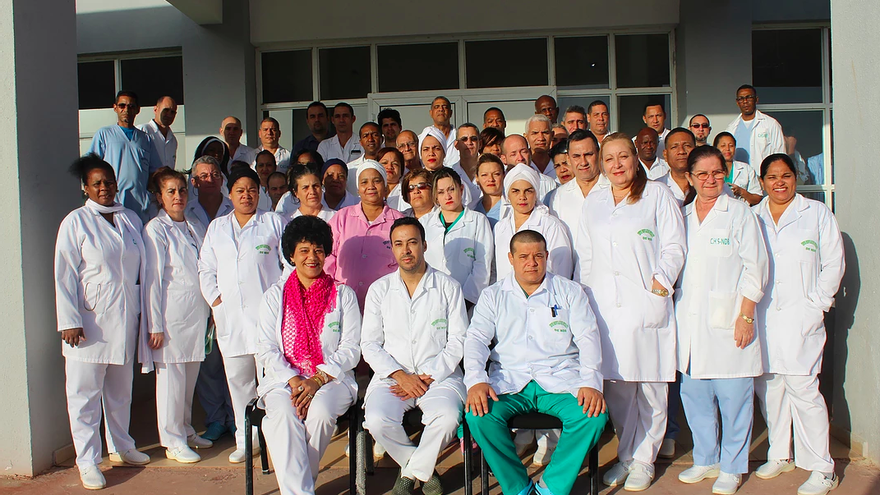
![]() 14ymedio, Havana, 20 September 2019 — The death of Cuban doctor Juan Manuel Obana Borges, in a bathroom at the Charles de Gaulle airport in Paris, has put a new internationalist mission under the spotlight, this time the one established in Mauritania. After a strong conflict with the management of the hospital where he worked, Obana was expelled by the brigade chief and sent to France, where he was found dead from an alleged heart attack.
14ymedio, Havana, 20 September 2019 — The death of Cuban doctor Juan Manuel Obana Borges, in a bathroom at the Charles de Gaulle airport in Paris, has put a new internationalist mission under the spotlight, this time the one established in Mauritania. After a strong conflict with the management of the hospital where he worked, Obana was expelled by the brigade chief and sent to France, where he was found dead from an alleged heart attack.
A nurse, Obana’s colleague from the mission at the Specialties Hospital Center of Nouadhibou, has sent a letter to 14ymedio in which she denounces the terrible working conditions faced by the team of 60 Cuban collaborators and asks to remain anonymous “for obvious reasons.”
The medical worker says that nurses take 24-hour shifts with just another 24 hours off, which is about 360 hours per month, 168 more than that established in international agreements, and they are not paid overtime.
Nor are doctors paid overtime, although they work from Monday to Sunday night. None of the collaborators are paid during their vacations and, if they must return to Cuba for some serious unforeseen event, the Government does not contribute to paying for the ticket, which can amount to up to 2,000 euros, approximately two months’ salary.
The nurse regrets that Cuban athletes or artists abroad receive a greater share of their income than do health workers, who only receive 20% or 30% of the salary set in the agreement. The rest is kept by the Cuban state.
As if that were not enough, the nurse, who has already returned to Cuba from the mission, says that her co-workers have told her that they have suffered a cut in their salary since this September and will earn 300 dollars less per month.
“They were told that whoever does not agree with the reduction of the salary can return to Cuba to continue earning their 60 CUC per month, and that anyone who does not want to continue in the mission because of that must pay for their own return ticket. What a mockery!”
To the bad economic conditions are added the bad labor ones. To begin with, the nurse denounces the requirement to travel on the official red passport, with no option to get the blue one. In addition, their passports are taken from them when they arrive in the country where they are working. “Mauritania is no exception, I was undocumented for more than a year in that country.”
On the other hand, as part of the propaganda operation, the nurse affirms that it is not only forbidden to dissent and say that one is there for money instead of solidarity, but that it is mandatory to be part of the patriotic celebrations (January 1, 26 July, August 13, September 28, October 8 and 28) “even if you don’t have the desire,” and to promote the work of the brigade and support the regime on social networks “even if you think they are bungling and corrupt exploiters.”
Her description of the brigade chief deserves a separate chapter. She accused her of being “despotic, lacking in ethics and feared by the collaborators for her constant use of threats and blackmail.” In addition, she affirms that the chief always supports the Mauritanian leadership instead of supporting her exploited fellow countrymen and is responsible for maintaining a toxic environment in the mission.
“Arrogant and conceited, with a shrill and abusive voice, just for pleasure, to the collaborators. (…) All this is known by the mission leadership in Cuba; we assume that it suits them to have such a tyrant, creating shock and terror,” says the professional without sparing words.
Healthcare in Mauritania is private and patients must pay for treatments to be seen, and it is incomprehensible to the nurse that the Cuban Government would deal with such a system.
“Services are denied to people who do not have the resources to pay, even with imminent danger to life; service to pregnant women and to critically ill patients is delayed, while waiting for payment. Until the payment is deposited we cannot touch the patient. Many patients, in deplorable condition, have had to go to other hospitals because of not having money.”
“Where are the humanitarianism and altruism that the Cuban Government boasts about so much? (…) What hypocrisy, let’s take off the mask, what matters to the Cuban government is money and not people. When I say they don’t care about people I include the Cuban collaborators.”
The export of health services is the main source of income for the economy of the Island with some 34,000 doctors in 66 countries and revenues of $6.4 billion dollars in 2018, according to official figures. Hence, the nurse asks: “Why push professionals to the limit when they are the salvation of such a weak economy?”
__________________
The 14ymedio team is committed to serious journalism that reflects the reality of deep Cuba. Thank you for joining us on this long road. We invite you to continue supporting us, but this time by becoming a member of 14ymedio. Together we can continue to transform journalism in Cuba.
